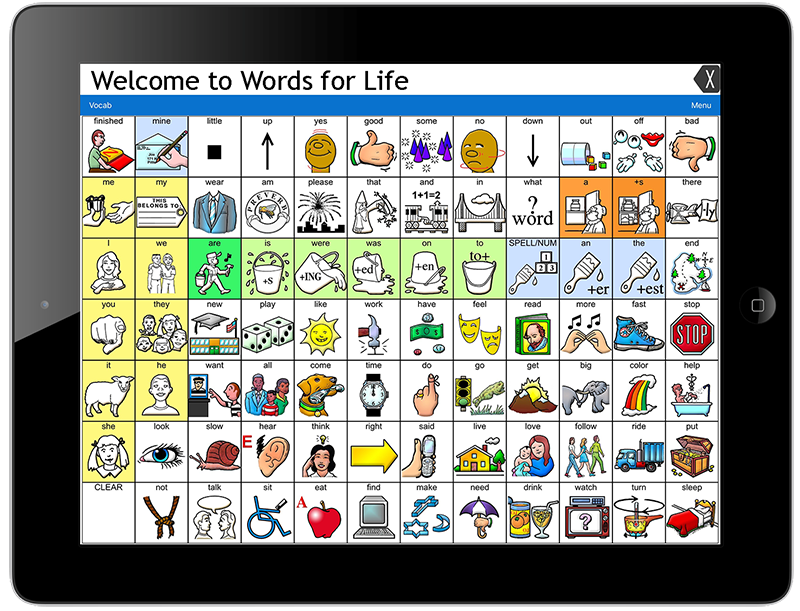
Lance McLemore is an Augmentative and Alternative Communication (AAC) user from Ohio who uses LAMP Words for Life. I recently met Lance at the ATIA (Assistive Technology Industry Association) conference in Orlando last month. He is a regular public speaker on the topics of AAC and forming relationships with AAC users. This week he discussed some of the loneliness and social isolation he experienced growing up, his experience using an AAC device, and tips to improve inclusion for AAC users.
When did you receive your Autism diagnosis? What have been some important factors in helping you develop a positive Autistic identity?
I got my diagnosis in 2006. To be honest, I’m not sure I have a positive autistic identity. It’s been difficult for me to figure out how to fit into the world. It often seems like there’s no room for me. I was born into a world that’s not designed for me, and I’m surrounded by people who are not like me. I wish I could say that I have made peace with the fact that I’m different, but I just haven’t gotten to that point yet.
You’ve spoken about the loneliness you experienced both before you had an AAC device, and after as well, since you didn’t know how to use the device to make friends. What advice do you have for either new AAC users or parents of children learning an AAC device that might help them address loneliness or social isolation?
Social isolation for AAC users is a big problem. I would consider myself an efficient fluent user, but even for me it’s a struggle. For someone new to AAC I can imagine it’s much more difficult. Finding other people with similar interests helps. Communication partners will need to take a very active role in conversation until the AAC user can become more proficient with their device and also get better with pragmatics. Mentorship is probably the most important thing.
You started using an AAC device even though you had the ability to speak (at least partially). Can you explain what was attractive about using an AAC device? What benefits did it have over using verbal speech for you?
An AAC device was attractive, because I wanted to be understood all the time. It allowed me to communicate without having to push myself to the point of exhaustion. I could relax and enjoy the conversation. I didn’t have to keep repeating myself as my speech would become less and less intelligible. People will only put in so much effort to understand before they give up on you and leave. I can say what I want and be understood the first time.
What do you like most about the AAC device you use today? What advantages does it have over similar technologies, in your opinion?
I like the size and weight of my communication device. However, what’s most important is the language system. I use LAMP Words for Life. It has close to 5,000 of the most frequently occurring words in the English language. I’m able to communicate almost as fast as a person can speak verbally. It’s faster than any other system I have tried.
What mistakes, if any, do you see people make who are new to using an AAC device (or their families)?
I think AAC users should have their device set up so that it speaks each word as they go. I know some don’t do this, because it seems strange. However, there are advantages to it. If people can hear each word, they are less likely to interrupt when you’re constructing a message. Most people find it uncomfortable to wait in silence for you to finish a message and speak it. There are other reasons, but those are the most important.
The people around an AAC user can be resistant to the device out of fear it will hinder the development of speech. The research clearly shows that is not true. An AAC device is no different than eyeglasses or a hearing aid. A non speaking child should not have to languish in silence for months or years while everyone else gets their acts together.
In what areas would you like to see AAC improve?
Improvements can always be made to the hardware, but I’m more concerned about the language system. I don’t believe one size fits all, but a lot of systems are not that great. Many of them require a lot of navigation to say even a short sentence. I don’t believe categorical systems work well. And I don’t agree with primarily relying on phrases.
How can society be more inclusive of AAC users?
This is a difficult question in a way. The answer is simple, but implementing it is tricky. All I want is to be treated like you would treat anyone else. I want people to not just assume that I must be cognitively impaired simply because I rely on AAC to some extent. I don’t want to be excluded because I’m seen as different or because interacting with me takes too much time or effort. Everyone should keep in mind that disability is a universal experience. Every person, if they live long enough, will become disabled in some way to some extent. In the future, do you want people to be patient and understanding with you? Would you want to be excluded because you’re seen as too much of a nuisance? Wouldn’t you still want to have a social circle? Remember this when you talk to me and others like me.
